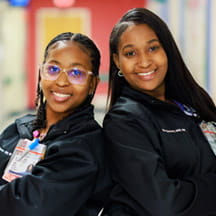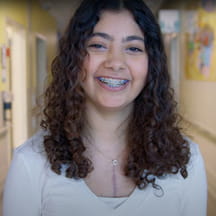For most people, navigating a career path is a series of potentially life-changing decisions. For Kimberly Pyke-Grimm, it was precisely that decision making process that sparked her life's work in medical research. Specifically, it's an interest in adolescent and young adult (AYA) cancer patients—and the difficult decisions they and their families face—that drives her.
"AYAs are an understudied population when it comes to decision making, so I became very interested in that topic," says Pyke-Grimm, Ph.D., RN, CNS, a nurse scientist at Lucile Packard Children's Hospital Stanford in Palo Alto, California, and a clinical nurse specialist at the Bass Center for Childhood Cancer and Blood Diseases. "I felt I needed to explore it—this really could be a lifetime of research."
Unique challenges for AYA patients
Pyke-Grimm's current research explores how well patients and their families understand, and can make treatment decisions about, genomic cancer treatments. It's a complex landscape for any cancer patient, but Pyke-Grimm says the AYA population faces a unique set of additional challenges.
They're amid a period of significant physical, emotional and social growth. At a time when their peers are becoming more independent, AYA cancer patients must rely more on their parents and family. And Pyke-Grimm adds that medication adherence can be challenging for this population, noting that overall outcomes for AYA cancer patients lag behind those reported for their younger and older counterparts.
"If we can engage them, empower them to manage their care and get them involved in making decisions early on and let that grow, maybe that'll make a difference in their outcomes," Pyke-Grimm says.
More nurses bringing expertise to research
Pyke-Grimm joins a growing number of nurses seeking to improve patient outcomes through scientific research. Given nurses' day-to-day experiences in patient care, Pyke-Grimm has more than 30 years of nursing experience herself–it seems a natural fit.
"Nurses are on the front line—they're the ones spending the most time with patients and their families," Pyke-Grimm says. "They get to be there and see what's working, what's not working and how we can change things to make them better."
Pyke-Grimm says the questions that fuel her research often come directly from her bedside experiences–and those of her colleagues. In short, her nursing experience makes her a better scientist.
But she also believes her work in clinical research has made her a better nurse. "When you become a scientist, you start to become very data-based," Pyke-Grimm says. "You start to look at things a little more carefully and from an evidence point of view to drive the practice of care. I think that's a good thing."
Experience as a parent informs work
There's another important influence that informs Pyke-Grimm's work both as a nurse and a researcher—her role as a parent. As the mother of two children born with serious heart conditions, she knows how it feels to face difficult treatment decisions.
"It's really helped my research to have been on the receiving end of care—knowing which questions to ask families and how to ask them," Pyke-Grimm says. "If we can make it easier for families or provide what they need to help them make these decisions, it's pretty important work."


